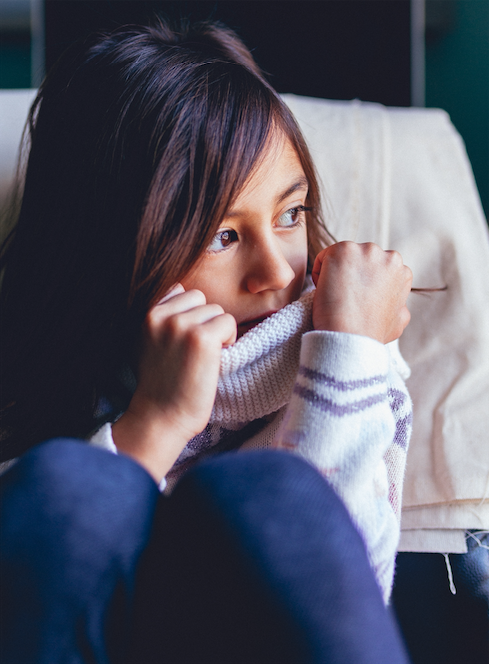Part I: How Domestic Violence Impacts Children

The blog below is the first in a two-part series. Check back next week to learn how to talk to your children about domestic violence.
It is common to believe that children don’t see or hear everything that happens in the home. Maybe they were thought to be asleep when the abuse occurred, or they were so young when the abuse happened, there’s no way they could remember anything, right? What if they only heard verbal and emotional abuse and didn’t witness any physical violence? These are some of the questions frequently asked by concerned mothers wondering how the abuse they experienced will impact their children.
The reality is that children are significantly impacted by abuse. Whether a child witnessed or experienced verbal, emotional or physical abuse, the impact on his/her behavioral, emotional and physical wellbeing can have long-term effects. In our experience of working with mothers, we understand that talking about the effects of domestic violence on children can feel overwhelming and even hopeless at times, so it’s important to know that it is possible for a child to heal from experiences of domestic violence. Children are resilient and through the help of a supportive, healthy parent, we have hope in their ability to heal. With that in mind, it is also important to recognize the effects domestic violence can have on children so that we can understand their feelings and behaviors, and learn how to best help them heal.
Emotional Impacts
Children often internalize many of the emotions they experience, which can create confusion in their inner world. Feelings of guilt and shame are common because the child cannot stop the abuse or they believe they caused it, along with feelings of fearing the abuser, anxiety about his/her safety, or fear of what may happen to the family. A child may feel conflicted about feeling angry at the actions of the abuser, but also love him because he’s his/her father. There might be complicated feelings of grief and loss over changes that have occurred in the family, or a child may feel the burden of responsibility to care for and protect the family.
Behavioral Impacts
There are a wide range of behaviors that children may exhibit due to abuse. The emotional impacts of abuse listed above can become internalized, and when not expressed properly, feelings of grief, guilt, shame, fear and confusion are externally observed as anger and behavior issues. Children may act out, withdraw, become attention seeking, refuse to go to school, have difficulty concentrating on academics, become aggressive, have nightmares, overachieve or underachieve, and lose interest in activities they were once interested in.
Physical Impacts
It is also common for a child’s traumatic experiences of abuse to manifest through physical symptoms. A child may have more body-related complaints such as headaches, stomachaches, difficulty breathing, aches and pains, feeling sick often, tired, a neglect in personal hygiene, or a developmental regression such as wetting the bed or thumb sucking. It is important to get any somatic (relating to the body) symptoms addressed by a physician, as these symptoms may be a result of trauma.
Social Impacts
Dealing with the abuse can become a barrier to how well a child relates to others socially. A child may isolate themselves from others because they might believe no one will understand their experiences. They may have poor conflict resolution skills or trouble maintaining friendships because it is difficult to trust others. On the other end of the spectrum, they may be extremely involved with friends and extracurricular activities to stay away from the abuse at home. Similarly, a child might be more passive in friendships or relationships, or they might seek power in friendships to feel more in control.
Cognitive Impacts
The internal feelings children might be wrestling with often turn into thoughts and beliefs about themselves and how they view the world. For instance, feelings of shame and guilt may cause them to believe they were somehow responsible for the violence. They may begin to blame others for their behaviors, or believe it’s okay to express anger to get what you want, as was modeled for them by the abusive parent. They might believe that they can’t ask for what they need or trust in others. Since the abusive parent often blames his actions on his anger, they may feel that it is bad to feel angry. All of these thoughts and beliefs have a significant impact on a child’s self-esteem and the way he/she navigates the world.
Reading this information can feel overwhelming, but it is NOT hopeless. Children can and do heal from experiences of domestic violence. Once we begin to understand the impact that abuse has on children, we can recognize these concerns and symptoms for what they are. By entering into your child’s world, giving them information about abuse at an age-appropriate level, and seeking help and healing for yourself, there is hope.
Faith Brugner is a women and children’s therapist at Genesis Women’s Shelter & Support
